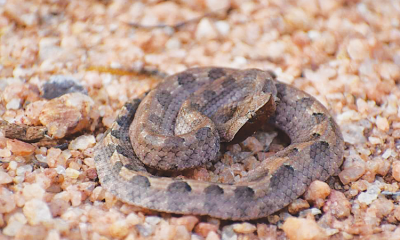News
Snakebite not a cause for Chronic Kidney Disease, study reveals
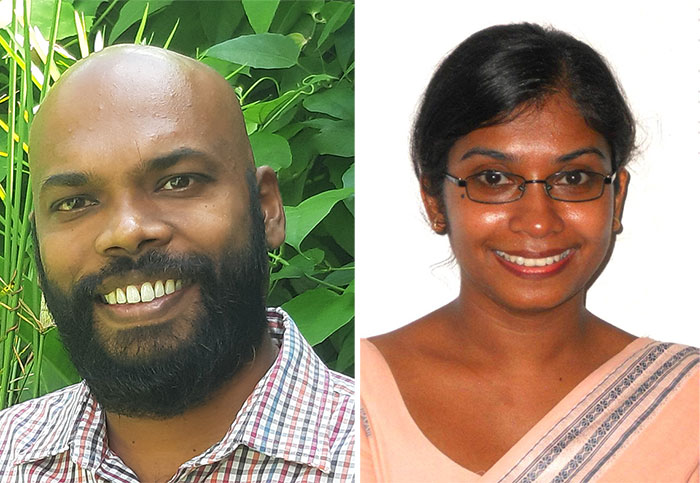
By Ifham Nizam
Snakebite is not a cause of the Chronic Kidney Disease of Unknown Aetiology (CKDu) in Sri Lanka, a latest study reveals.Lead researcher of the project Prof. Anjana Silva of the Rajarata Medical Faculty told The Island: “We have so far investigated in depth how snakebite causes paralysis in humans, the effectiveness of anti- venom for treating these patients as well as affordable tests to detect snakebite at the bedside and other long-term effects of snakebite.”
Prof. Silva says there are still many things that the team is not clear about, relating to snakebite so they need to continue the studies in the long run not only to understand more about snakebite but also to make a real improvement in the treatment and prevention of this unfortunate, preventable health hazard
Chronic Interstitial Nephritis of Agricultural Communities (CINAC), also known as Chronic Kidney Disease of Unknown Etiology (CKDu), has been a major health issue in Sri Lanka, and has claimed many lives, especially in the North Central Province, and other agricultural areas.
Although the exact cause of this ‘mysterious’ disease has not been elucidated, several hypothesis, including a mix of possible causes, such as water, agricultural activities, agrochemicals, heavy metals, snakebite and heat stress, have been previously attributed by scientists.
A recent research study, by a team of researchers from the Faculty of Medicine and Allied Sciences of Rajarata University, published in a leading medical journal, Clinical Toxicology, revealed that snakebite is unlike to be a cause of CINAC or CKDu in Sri Lanka. This study was conducted as a part of the PhD study of Dr. Subodha Waiddyanatha, where she followed up 199 snakebite patients, four years after the snakebite, and 168 patients, one year after the snakebite.
“At the time of snakebite, we have collected all the information of these patients, including the data on their kidney function. We compared this data with their kidney function, one and four years after the snakebite, and found no evidence of any association of venomous snakebite, with reduced kidney function. We found that those patients who had kidney failure after the snakebite, completely recovered when we studied them one and four years later,” Dr. Waiddyanatha said.
She said that a small number of patients, who had reduced kidney function, at the follow up, had clearly identifiable other causes of poor kidney function, such as diabetes and hypertension. This means that a snakebite is unlikely to be a cause of CINAC or CKDu in Sri Lanka. “However, we still need to closely monitor a large number of patients who develop severe kidney failure, after snakebite, to clearly understand how many of them could have reduced renal functions in the long run,” Dr. Waiddyanatha added.
“This study was conducted as a part of ‘Anuradhapura Snakebite Cohort’, probably the largest snakebite research study in the world, that was started in 2012 by a team of researchers from the Rajarata Medical Faculty that included Prof. Sisira Siribaddana, Dr. Senaka Pilapitya and myself, in collaboration with one of the foremost snakebite researchers in the world, Professor Geoffrey Isbister from Newcastle University, Australia. South Asian Clinical Toxicology Research Collaboration was instrumental in providing logistics for the study”, she said.
News
SLPP MP killing: 12 Aragalaya activists sentenced to death
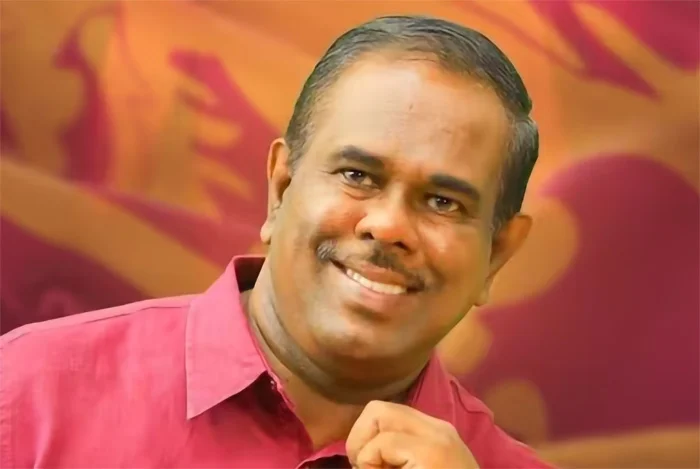
… ex-Public Security Minister says lives of MP and bodyguard could have been saved
The Gampaha High Court Trial-at-Bar yesterday (11) sentenced 12 persons to death by hanging over the May 9, 2022, killing of former Polonnaruwa District SLPP MP Amarakeerthi Athukorala and his police bodyguard. They were among altogether 39 persons tried by the High Court for the double murder. Of the remaining accused, four persons were handed six-month sentences, suspended for five years, and 23 others acquitted by the Gampaha High Court Trial-at-Bar, consisting of High Court Judges Sahan Mapa Bandara Rashmi Singappuli and A.D. Ruwan Pathirana.
Of the 12 sentenced to death, one continues to evade the law.
The verdict was to be announced on January 14.
Sri Lanka suspended implementation of the death penalty in 1976. The EU has repeatedly warned that resumption of judicial executions would result in consequences.
The new entrant to Parliament, and his bodyguard, were lynched by a ‘Aragalaya’ mob, in broad daylight. They were on their way back to Polonnaruwa when the gang intercepted the MP’s car, in the Nittambuwa town, during violence unleashed in the aftermath of SLPP goons’ attack on those camping at the Gotagohome site at Galle Face.
Footage secured from a nearby CCTV camera showed MP Amarakeerthi Athukorala fleeing the scene with his security officer, who was armed with a gun. Dozens of suspects had been subsequently arrested on several occasions on suspicion of involvement in the MP’s murder. The MP and police officer were killed in a garment store where they took refuge.
Earlier, the case caused major controversy over the Gampaha High Court Trial-at-Bar granting bail to all suspects. The Attorney General appealed to the Supreme Court (SC) to cancel the bail granted by the High Court Trial-at-Bar. The AG argued that releasing the accused on bail would impede a fair trial. The AG asked that the SC cancel the bail order and requested that the accused be placed in remand custody till the conclusion of the trial.
One-time Law and Order Minister Rear Admiral (retd) Sarath Weerasekera told The Island that the lives of the parliamentarian and his police bodyguard could have been saved if the military swiftly responded to the then developing situation. Former Colombo District MP said that he told Parliament that the Army, in spite of having troops at Nittambuwa, didn’t intervene. The powers that be never inquired into the lapses on the part of those responsible for maintaining law and order, the ex-Minister said, alleging that successive governments conveniently neglected that responsibility.
by Shamindra Ferdinando
News
Over one million Lankan devotees venerate sacred relics
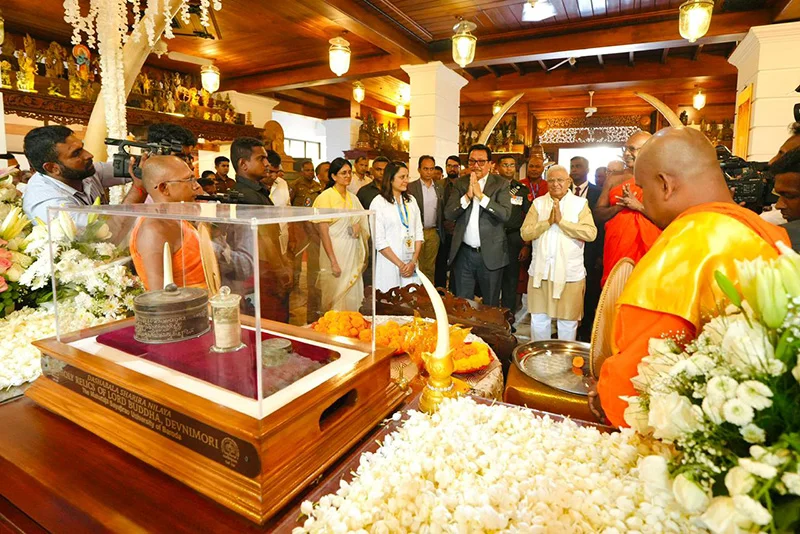
The Devnimori Relics of Lord Buddha, brought to Sri Lanka on February 04, 2026, departed for India on February 11, 2026, after the successful conclusion of the Exposition at the Gangaramaya Temple in Colombo. The Relics were accompanied by the Governor of Madhya Pradesh Mangubhai C. Patel, and Deputy Chief Minister of Arunachal Pradesh, Chowna Mein, on their return journey.
At the ceremonial departure, at the Bandaranaike International Airport, Minister of Buddhasasana, Religious and Cultural Affairs (Dr.) Hiniduma Sunil Senevi, Deputy Minister of Buddhasasana, Religious and Cultural Affairs Gamagedara Dissanayake, and High Commissioner of India Santosh Jha, were present to see off the Buddha Relics.
IHC spokesperson: ” During the visit, the delegation led by Governor of Madhya Pradesh, and Deputy Chief Minister of Arunachal Pradesh met Minister of Foreign Affairs, Foreign Employment and Tourism Vijitha Herath, Deputy Minister of Environment Anton Jayakody, and Governor of North Western Province Tissa Kumarasiri Warnasuriya. In addition, the dignitaries interacted with members of the Indian-origin community in Sri Lanka.
The Exposition was inaugurated by President Anura Kumara Dissanayaka from the Sri Lankan side, and Governor of Gujarat Acharya Devvrat, and Deputy Chief Minister of Gujarat Harsh Sanghavi from the Indian side, in the presence of the Chief Incumbent of the Gangaramaya Temple Ven. Dr. Kirinde Assaji Thera at the Gangaramaya Temple, Colombo, on February 04, 2026. The week-long Exposition saw over a million devotees paying their respects. Prime Minister of Sri Lanka (Dr.) Harini Amarasuriya and several Cabinet Ministers, as well as the Speaker, the Leader of Opposition, former Presidents and numerous other Members of Parliament paid their respects during the course of the Exposition.
The Exposition marked the first public veneration of these Holy Relics outside of India. Complementing the exposition, two exhibitions titled “Unearthing the Sacred Piprahwa” and “Sacred Relic and Cultural Engagement of Contemporary India” were also held to showcase the shared Buddhist heritage of India and Sri Lanka.
The Exposition was announced by Prime Minister Narendra Modi during his State Visit to Sri Lanka in April 2025. The Exposition further reinforced the spiritual and cultural linkages between the two civilizational partners. India remains committed to deepening the linkages between both countries through continued bilateral initiatives and regular exchanges between the monastic and scholarly communities.”
News
Flooded Chemmani mass grave cleared amidst persistent rain
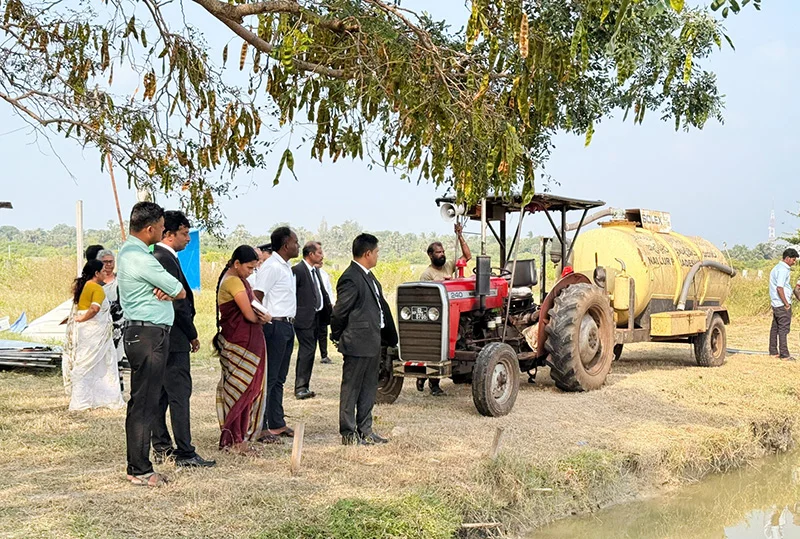
Action was taken on Monday (9) to drain rainwater from the Chemmani mass graves as preparations continued for the next phase of excavation, Tamil Guardian has reported.
During the first and second phases of excavation at Chemmani, a total of 240 sets of human skeletal remains were identified. Of these, 239 sets have so far been exhumed under court supervision.
Although funds had already been allocated and preliminary arrangements were in place to begin the third phase of excavation, persistent heavy rainfall, in Jaffna, since November last year, resulted in rainwater stagnating within the burial site, bringing the process to a halt.
In response, steps were taken on Monday to remove the accumulated water with the assistance of the Nallur Pradeshiya Sabha. However, despite the drainage, the site remains heavily waterlogged and muddy, making immediate excavation unsafe, Tamil Guardian reported.
As a result, it has been decided that a determination on when the next phase of excavation can commence will be made on 16 March, when the case is due to be taken up again. The matter has been adjourned to that date.
The drainage operation was inspected on site by a team that included Jaffna Magistrate S. Lenin Kumar, Judicial Medical Officer Sellaiyah Pranavan, and Attorneys-at-Law Niranjan and G. Rajitha.
Tamil Guardian disclosed that funds allocated last year by the Ministry of Justice for the third phase of excavation have lapsed and been returned, as the work could not proceed within the allocated timeframe. As a result, a fresh budget proposal must now be submitted for the current year in order to secure the necessary funding.
The Judicial Medical Officer has taken steps to submit a new cost estimate to the court, so that the excavation process can resume once conditions at the site permit.
-

 Features4 days ago
Features4 days agoMy experience in turning around the Merchant Bank of Sri Lanka (MBSL) – Episode 3
-

 Business5 days ago
Business5 days agoZone24x7 enters 2026 with strong momentum, reinforcing its role as an enterprise AI and automation partner
-

 Business4 days ago
Business4 days agoRemotely conducted Business Forum in Paris attracts reputed French companies
-

 Business4 days ago
Business4 days agoFour runs, a thousand dreams: How a small-town school bowled its way into the record books
-

 Business4 days ago
Business4 days agoComBank and Hayleys Mobility redefine sustainable mobility with flexible leasing solutions
-

 Business1 day ago
Business1 day agoAutodoc 360 relocates to reinforce commitment to premium auto care
-

 Business5 days ago
Business5 days agoHNB recognized among Top 10 Best Employers of 2025 at the EFC National Best Employer Awards
-

 Business5 days ago
Business5 days agoGREAT 2025–2030: Sri Lanka’s Green ambition meets a grid reality check


